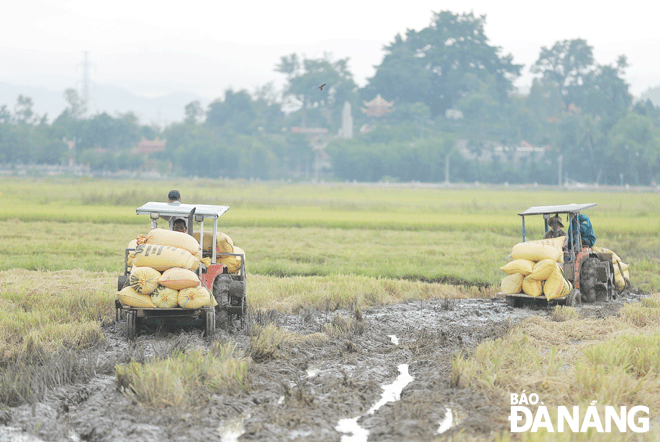Bringing farming back to nature
In the context of the COVID-19 pandemic, climate change has been happening rapidly and strongly, along with increasingly scarce natural fuels. It is time to re-establish the issue of agricultural production in accordance with nature and reasonable, effective distribution to reduce the gap between the current "excess" and "shortage" of food.
 |
| Farmers in Hoa Vang District are harvesting rice. Photo: PHUC AN |
“It is important to reflect on what has happened in relation to agriculture and health in human history. We have seen great strides in modern medicine, but medical progress is of little value as the number of sick people continues to rise.
The same goes for modern agriculture. How can we commend ourselves for the progress in modern agriculture, including the dramatic increase in productivity, if the rates of undernutrition, food scarcity, exhaustion and disease even increase faster?", quoted in the book titled ‘Sowing Seeds in the Desert’ written by Masanobu Fukuoka (1913-2008), a Japanese farmer and philosopher.
Natural farming
Mr. Masanobu Fukuoka is also the author of the famous book ‘The One Straw Revolution’, which presents his views on the philosophy of farming in accordance with nature.
By analyzing the efficiency of farming methods, including hi-tech agriculture, Masanobu Fukuoka points out “High-tech farming methods give people the illusion that even if the soil loses its fertility, people can certainly still produce food. But if gasoline were to become scarcer even a little bit, food production would drop dramatically and immediately.”
Therefore, he brought the philosophy of "doing nothing" (no fertilizer, no weeding, no chemicals, no ploughing) into the practice of farming in his own garden and finally succeeded in crop yield and soil quality despite many initial failures. Thereby, he concludes that we must realize that both in the past and in the present, there is only one possible 'sustainable' path that society must follow. We have to find our way back to nature by re-greening the earth, sowing seeds in the desert.
Cooperation between producers and consumers
While Mr Masanobu Fukuoka practices agricultural production following nature and elevates it to a philosophy, the French couple Daniel and Denise Vuillon aim for efficiency in cooperation and linkage between producers and consumers to organize the production and consumption of clean agricultural products.
In the book ‘The first AMAP Story’- supporting farmers to feed themselves sustainably, Denise Vuillon introduces this practice with 3 models in the US, France and Japan, respectively CSA/AMAP/Teikei(*)
All three models rely on the basic principle that consumers place orders in advance, then manufacturers base on them to organize production by ecological production methods without using chemical fertilizers, pesticides, and genetically modified crops to ensure quality and safety for redistribution to consumers.
Denise Vuillon believes that distribution with on-site communication is the embodiment of AMAP. Although the Internet is a supporting tool, it can not replace human contact, tours or meetings in distribution sessions - where all is expressed, explained, demonstrated face-to-face and in trust.
Meanwhile, Mr Alain Chatezrault describes his first AMAP experience as a transformation from a dying farmer to a new farmer. “Healthy production is a step logically as we're closer to the consumer's plate. The smooth start of production in AMAP has shown me it's possible. This will lead to the agreement to move the entire farm to organic farming,” he said.
In the early 1970s in Japan, as young Japanese mothers were too desperate to find safe and uncontaminated food from conventional sources, they joined hands with farmers to form the Teikei model.
Accordingly, these mothers decided to take responsibility for the food they eat and were willing to offer to pay the producer upfront, provided that he or she committed to healthy, pesticide-free production. Although plants grew slowly, they just needed farmers to work towards the ultimate goal of healthy organic farming that respects ecology and life.
In the current trend of smart consumption with clean and safe food, these above-mentioned models need to be researched to deploy effectively. Not only do these models better serve people's demands, but they contribute to protecting the environment, reduce the speed and unpredictable consequences of climate change on the planet.
Reporting by ANH QUAN- Translating by T.VY
(*) AMAP: Association for the Maintenance of Peasant Agriculture
CSA: Community Supported Agriculture (in USA)
Teikei: Japanese version of CSA / AMAP